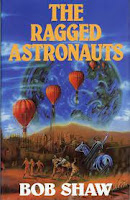As is obvious to everyone except the people who believe in the value of sff awards, popularity does not automatically equate to literature that transcends it's era. Accordingly, many if not most of the nest sff books of the past century lie outside that matrix. And it's that type of book I hope to find exploring those strange byways of literary history. I have heard a few whispers that Bob Shaw is a name virtually lost to genre history worth a read. Let's take a look at The Ragged Astronauts (1986).
Land and Overland, sister worlds separated by only a few thousand miles, are the setting of The Ragged Astronauts. Things begin on Land, a planet with no metals. Technology and industry plant-based, but the manner in which people organize themselves remains familiar. Although the first quarter of the novel takes its time settling in, it eventually does on the character Toller, a rebellious but natural reader employed in menial labor for the Philosophers, a group of people who speculate on and research the latest scientific breakthroughs. Slowly depleting itself of resources, the monarchy Toller is a reluctant part of makes some drastic decisions to fix its situation, his role in the transformation soon to be more than menial.
The Ragged Astronauts is a classic science fiction adventure with a sense of wonder many such novels strive for but fail to achieve. The flow of story could be smoother and characterization could be less choppy. But those facts do not stop the story from getting its hooks into the reader.
On top of the nicely imagined set pieces (a la H.G. Wells and Jules Verne), The Ragged Astronauts remains purposeful but fundamentally unpredictable. The characters, while not fully developed, retain a human grayness. Toller, while certainly leaning heavily toward 'classic hero' the more the novel progresses, does not lend himself those airs in the early going. Another thing going for the novel is editing, in turn leading to pace. To explain, each chapters is one scene. Like a stone skipping across water, there is nothing in the way of transitory exposition between hops. And because the chapters are insular, explanations of what came before and after must be slyly inserted, something Shaw does reasonably well. The end result is the illusion of pace, i.e. chapters constantly hop forward—no dawdling (as much fantastika is wont to do). This also leads to brevity. At 300+ pages, Shaw is able to accomplish what most modern authors require 500+ to do. They feel the need to worldbuild ad infinitum, whereas Shaw accomplishes the same in half the page count. Take note, you modern authors, you.
The Ragged Astronauts reads like Keith Roberts-lite, Brian Aldiss-adjacent, or perhaps even early Christopher Priest (e.g. The Inverted World). It does not have Roberts' dark, brooding prose or deep rooted metaphors and symbolism. But it does have a similar sense of enclosed imagination, of building a finite place with interesting little details. The human concerns and the manner in which they are expressed is not unlike Aldiss, though likely Aldiss is the smoother writer in terms of diction and syntax. And early Priest, just a loose similarity in terms of world and society-building. All in all, not bad company.
If there are any challenges to the novel, one would be consistency of prose. Overall the words move in chip-chap-chop rhythm, but can occasionally soften. The result is a cat's tail; it lies at rest most of the time but can be twitchy. Another potential—potential—challenge is that Shaw occasionally plays a little fast and loose with his world. This is mostly around the need for ultra-hard materials like iron and steel, which the world does not have. Shaw occasionally waves his hands to create such things in order to progress the points the plot needs. I don't get too bothered by such things, but the gods know there is a bandwagon of 'hard sf readers' out there who will. If anything it's a bit inconsistent.
But I think the biggest complaint is that Shaw doesn't build full enough characters for the personal drama which occurs to be fully believable. Motivations are relatively clear, but there is an emotional element not fully described that leaves the inter-personal conflicts and connections which occur base and simple. A layer of emotional realism would have really propelled this novel.
In the end, I would not chalk up The Ragged Astronauts up to the science fiction Hall of Fame, but it definitely possesses a nice bit of imagination and drama that oscillates between realism and stereotype. Shaw's style is just obtuse enough to put him off the beaten path, and there is enough cynicism inherent to character actions and decisions to have a mild layer of commentary on the human condition. It's taken me a while to get to this novel; it's been on the ol' to-read list for some time. But I'll definitely be checking out other of Shaw's acclaimed novels, e.g. Orbitsville, some time in the future.


No comments:
Post a Comment